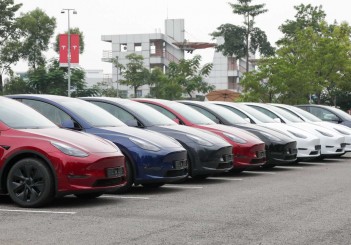Factory doors are reopening after nations from Denmark to Germany began easing restrictions on public life, with Italy, France and Spain to follow.
But it won’t be a sudden return to business as usual. Companies will have to implement social distancing and hygiene measures to keep workers safe, after the pandemic claimed more than 110,000 lives in the region.
The restart is crucial to pull the European economy out of a tailspin that’s forced governments to pledge hundreds of billions of euros to keep companies afloat.

The first shift of VW workers returning to work today at the Wolfsburg plant was cause for media attention.
Measures of private-sector business activity plummeted to an all-time low in April, with record job cuts. Even in Germany, the nation that may weather the crisis best, business sentiment is “catastrophic,” according to the Ifo research institute.
But while shutting down factories is relatively easy, ramping them up again is more complicated because even small kinks in the supply chain can cause major disruptions, said Michael Groemling, an analyst at the Cologne-based German Economic Institute.
“What complicates matters even more is that no one knows for sure how demand in the key markets in Europe and the U.S. will shape up in the coming months,” Groemling said by phone.
PSA Group, for one, isn’t saying when it will reopen European factories. The maker of Peugeot, Citroen and Opel automobiles said there’s no point in building up inventories while sales are dormant. “It’s important to have dealership and sales activity before we push the button,” Chief Financial Officer Philippe de Rovira told analysts.
READ MORE: VW reshapes workplace safety as virus threat lingers

While the extent of the reboot differs by country (Portugal, for example, has allowed most factories to keep running throughout the crisis), it’s happening gradually.
Moving too quickly, or carelessly, risks contributing to a second wave of infections that would turn the recovery effort on its head. And some segments of the economy - think bars and restaurants, air travel or movie-going - will probably remain disrupted for some time.
Europe’s car industry, which accounts for about 14 million jobs across the region, is eager to get back to work, even though it’s unclear whether buyers will return to showrooms once lockdowns are lifted.
Fiat Chrysler Automobiles NV, the Italian-American carmaker, will restart production at its Sevel light van plant in southern Italy and resume some operations at other factories across the country today. Ferrari NV plans to reopen its Maranello and Modena factories in northern Italy on May 4.
Volkswagen, the world’s largest automaker, resumed production at its Wolfsburg plant today with 8,000 workers returning to work. Initially, Golf production would restart on a one-shift basis — with reduced capacity and longer cycle times. The car maker had also restarted its new ID.3 electric car production at a factory in Zwickau, Germany, on Thursday, saying it expects to start European deliveries of the vehicle this summer as planned.
Renault SA began a gradual ramp-up in France last week, starting with three engine and parts factories and as little as a quarter of employees. It’s providing safety measures such as protective gear, temperature monitoring and extra cleaning. The company has already reopened plants in countries including Spain, Portugal, Morocco and Russia.
Most carmakers aren’t revving up all their factories at once, and those that restore output are expected to run assembly lines at slower rates until demand climbs back toward pre-crisis levels.










